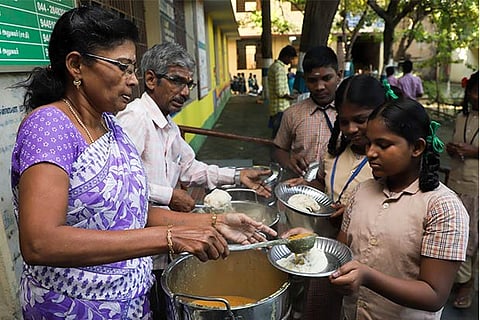

Chennai
After studying a project to provide breakfast to students of the schools run by the Greater Chennai Corporation for nearly a year, the school education authorities are eagerly looking forward to the coming budget when the government is likely to announce the extension of the project to the rest of the State.
Sources said the preliminary works are on to enhance the breakfast project into a scheme to replicate the success of nutritious noon meal programme (NNMP), which grew bigger and better over the years. It was in February 2019 that Kaalai Unavu Thittam, the initiative to provide breakfast for school children, was launched. It is being run jointly by the Greater Chennai Corporation and Akshaya Patra Foundation, under which the NGO would cook and deliver food served to students before classes commence.
Under this, each student is being given three idlis and 250 grams of pongal or upma along with sambar. “We are planning to introduce other items, including cakes, chapati, poori and khichdi,” said Sudama Vipra Dasa, the foundation’s spokesperson, adding that they are establishing a modernised kitchen.
A senior official from the School Education Department said that the objective behind the plans to extend the nutritious noon meal programme to include breakfast as well is to maximise the enrolment and reduce school dropout rates so as to universalise education.
This is expected to cost Rs 900 crore – the annual expenditure for noon meal programme is Rs 1,794.10 crore – said the official. “Feasibility study is being conducted to arrive at an exact data on recruiting additional cooks and meal organisers, besides the list of kitchen equipment to be purchased,” he said. “Nutrition experts will also be involved to derive the total calories and protein that has to be given to the children,” added the official. In addition to breakfast, the government is also planning to give groundnut barfi (candy) to children in the evening.
Replicating the successof noon meal programme
The officials are trying to build on the spectacular success of the noon meal programme, which was noted world over for simultaneously tackling multiple challenges, including increasing enrolment, reducing dropout rates, and providing nutritious food to children hailing from poorer families. Venkateswaran, a 45-year old artist in the city, still remembers the noon meals he had at school when he was 12. “I come from a poor background. My father, a cooli at Egmore station, could not admit me in a private school. I studied in a government school in north Chennai, which kept me hunger-free,” he recollected.
In the case of Shoba K, a domestic worker from Andhra Pradesh who settled in city about a decade ago, her three daughters are studying in the government school in Anakaputhur. “The noon meal that is provided at the school saves my daughters from hunger. Otherwise, we would not be able to afford different variety food every day,” she said.
These are just two among the thousands who have benefitted by the scheme. When the move to provide noon meal was initiated during K Kamaraj’s rule, few would have expected it to be so successful. It was expanded by the AIADMK regime headed by MG Ramachandran. Now, the programme feeds more than 50 lakh school children – the largest in the country – in 43,205 noon meal centres at an annual cost of Rs 1,794.10 crore.
In November 2001, the SC had directed authorities to provide cooked mid-day meals in all government and government-aided primary schools in all states. But till now, is has only been partially implemented in states like Himachal Pradesh, Uttarakhand, Maharashtra, Odisha, Assam, Arunachal Pradesh, Nagaland, Manipur, Mizoram, and erstwhile Jammu and Kashmir.
Citing reports collated by the Centre, a senior official from the Social Welfare Department said among the other states, Uttarakhand, Odisha and Bihar performed slightly better. However, even these states are far behind Tamil Nadu in terms of money spent and dishes provided. Most students in other states preferred mid-day meals due to hunger, while in Tamil Nadu, the majority preferred it because of tasty food and variety provided, he added. Much of the credit belongs to the teachers, said the official, pointing out how teachers were the key promoters of any scheme that benefits school children.
“The success of the scheme depends on how it is looked upon by the school authorities and how it is implemented at the school,” he added.
Another reason was ensuring community participation in the programme. “Another reason for the success is the vigilance committee, which is very active in carrying out surprise inspections at every school thrice a week,” he said. These committees comprise parents, teachers and local representatives. “We check not only the quality of the food but also hygiene in the kitchen. We also test food samples at our lab regularly,” said K Hemalatha, a government school teacher part of the vigilance committee in Kancheepuram.
Visit news.dtnext.in to explore our interactive epaper!
Download the DT Next app for more exciting features!
Click here for iOS
Click here for Android